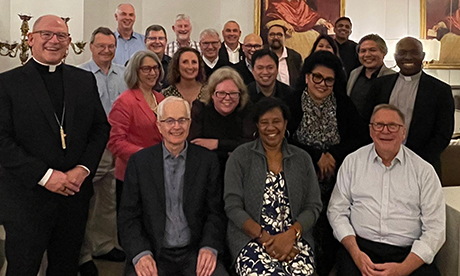A new Catholic support network that will extend across the Pacific aims to take care of Oceania’s migrant workers, refugees and their families.
The Most Rev. Anthony Randazzo of Broken Bay, Australia (pictured left), who is President of the Federation of Catholic Bishops Conference of Oceania, (New Zealand, Australia and the South Pacific Islands) says thousands of networks will be developed.
They will be used to provide pastoral and practical assistance, and better employment and healthcare to thousands of migrants and refugees.
After making the initial announcement last month in Rome where he had been attending the Synod on Synodality, Randazzo said the Migrant and Refugee Oceania Network will serve as a unifying voice offering much-needed support for the region’s unique challenges.
“This is what a Synodal Church looks like – where words are supported by actions that foster and generate real human relationships, a region not on the periphery but a region in which we live and work together in solidarity, making sure no-one is forgotten” he said.
The region
Oceania’s four episcopal conferences are based in New Zealand, Australia, Florida (the Episcopal Conference of the Pacific) and in Papua New Guinea and Solomon Islands (located in PNG).
The region covers a vast area of the Pacific. Of the 41-million people living in Oceania, international migrants make up almost 22 percent of the population.
Over a million of those originating in Oceania stay within the region.
Oceania faces unique and increasing challenges as a result of climate change, rising sea levels, floods, cyclones, droughts and disease.
What the support network will do
The Network will identify urgent problems and build programmes to respond to and protect the needs of people displaced within and across Oceania.
This will require cooperation and advocacy for the region at international levels.
The four episcopal conferences have committed to sharing information, skills, resources and practices.
The conferences will also connect smaller Pacific Island countries and dioceses through the International Catholic Migration Commission (ICMC) and the Dicastery for Integral Human Development at the Holy See.
“The key focus of this Synod is one of listening, dialogue and discernment, and that is very much the essential part of our shared journey in Oceania where every voice matters” Randazzo says.
“To counter the dominant voice from the North that forgets the vulnerable people and region from Oceania, we need to lead by example” he says.
“We can do this by calling others back to the Christian faith, not because we are dominant or powerful, but because we are walking with our brothers and sisters in Christ.
“Labelling us in Oceania as the periphery is unhelpful when we are proclaiming the Christian Gospel as one people in Christ.
“Together we can offer direct practical support as well as bringing our needs to the attention of the global community.
“This will lead to renewal, unity and a future filled with hope” Randazzo says.
Source
